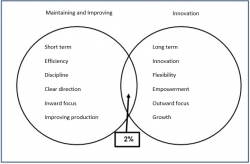What is the desired frequency of work teams' meetings – daily, weekly, or monthly?
When the team deals with sales development or debt collection, there is almost no new information on a daily basis, and so there's no need to meet daily.
But work on the production floor is continuous and at the very least daily. So there are new developments every day. Should results be analyzed daily? Weekly? Monthly?
In one of the companies I worked with, no such discussion took place. We set up teams which met weekly to analyze the various production data.
The result was an impressive and consistent improvement. Part of the process was daily analysis of production results.
Discussion was short and to the point, in a small team of managers and leaders. The previous day's problems were discussed, and answer to them given.
At the same time, improvement teams met weekly and results continued to improve.
After a few months, it seemed the daily meetings were enough, and we stopped the weekly meetings of the improvement teams.
A few months after that, we saw a slow but steady decrease in performance of the main indicators measured.
Why?
Daily meetings are very important. But also very short and to the point. It does not include production workers, and so it does not create in them a connection with company goals, and their thoughts regarding improvements aren't included, nor are they involved in initiating and carrying through corrective or preventative actions. As a result, they are less invested in acting to bring about improvements.
Weekly discussions, if involving a larger group including workers, also rely on daily and weekly data. But it includes people who don’t take part in the daily discussions. Other ideas are raised, and all employees feel part of company goals and act to achieve them.
Recommendation
Daily meetings: I recommend short daily meeting (about twenty minutes) about principal events in production. It should be based on data from the main indicators measured.
Weekly meetings: teams should meet to analyze and work to improve the main indicators, with an eye to sales, debt collection, and production. In production, the weekly team should include different people than the daily team.
Meetings should lest no more than an hour, and discussion should include low-points and suggested corrective or preventative actions. Every meeting should begin with a review of the actions decided on in the previous week. All actions should have a supervisor and a timetable.
Monthly meetings: management should meet once a month to examine the company's dashboard and the various teams' progress.












 My First Book: Manage! Best Value Practices for Effective Management
My First Book: Manage! Best Value Practices for Effective Management